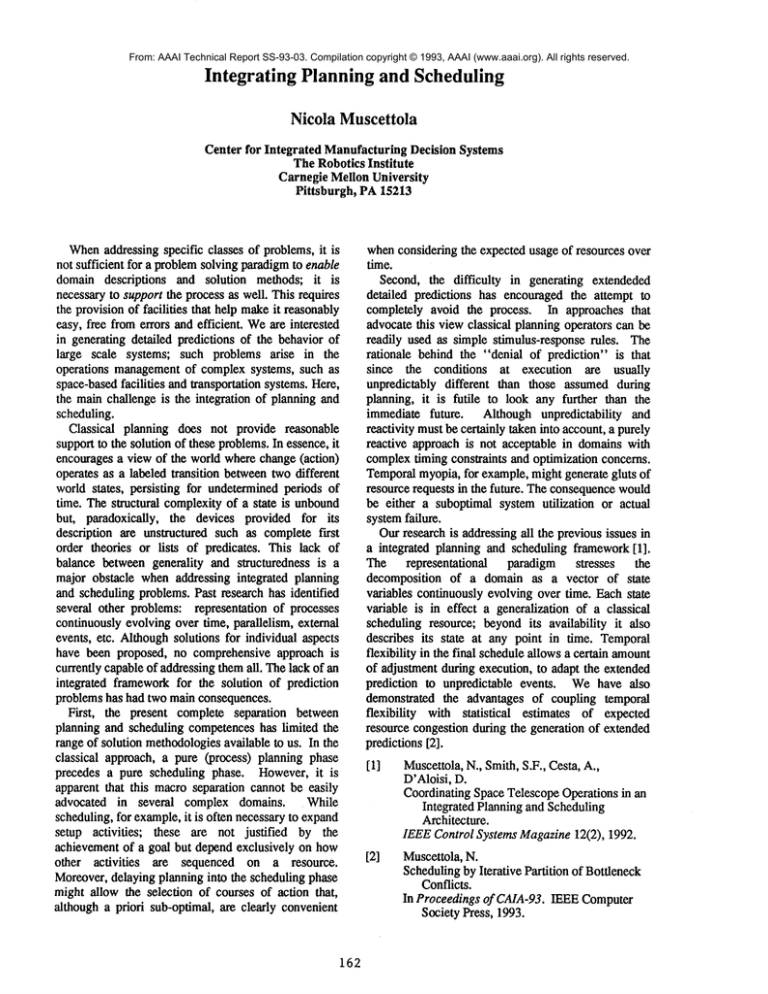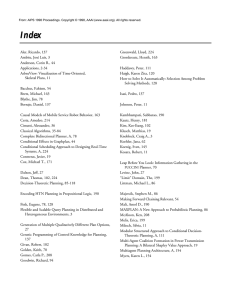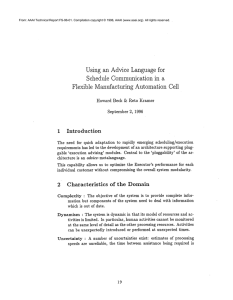
From: AAAI Technical Report SS-93-03. Compilation copyright © 1993, AAAI (www.aaai.org). All rights reserved.
Integrating Planning and Scheduling
Nicola Muscettola
Centerfor Integrated Manufacturing
Decision Systems
TheRoboticsInstitute
CarnegieMellonUniversity
Pittsburgh, PA15213
Whenaddressingspecific classes of problems,it is
not sufficient for a problemsolving paradigmto enable
domaindescriptions and solution methods; it is
necessaryto supportthe processas well. This requires
the provisionof facilities that help makeit reasonably
easy, free fromerrors andefficient. Weare interested
in generating detailed predictions of the behaviorof
large scale systems; such problems arise in the
operations managementof complexsystems, such as
space-basedfacilities andtransportationsystems.Here,
the mainchallengeis the integration of planningand
scheduling.
Classical planning does not provide reasonable
supportto the solution of these problems.In essence,it
encouragesa viewof the world wherechange(action)
operates as a labeled transition betweentwodifferent
world states, persisting for undeterminedperiods of
time. Thestructural complexityof a state is unbound
but, paradoxically, the devices provided for its
description are unstructured such as completefirst
order theories or lists of predicates. This lack of
balance betweengenerality and structuredness is a
major obstacle whenaddressing integrated planning
and schedulingproblems.Past research has identified
several other problems:representation of processes
continuouslyevolvingover time, parallelism, external
events, etc. Althoughsolutions for individual aspects
have been proposed, no comprehensiveapproach is
currentlycapableof addressingthemall. Thelack of an
integrated frameworkfor the solution of prediction
problemshas hadtwo mainconsequences.
First, the present complete separation between
planning and scheduling competenceshas limited the
rangeof solution methodologies
available to us. In the
classical approach, a pure (process) planning phase
precedes a pure scheduling phase. However,it is
apparent that this macroseparation cannot be easily
advocated in several complex domains. While
scheduling,for example,it is often necessaryto expand
setup activities; these are not justified by the
achievementof a goal but dependexclusively on how
other activities are sequenced on a resource.
Moreover,delayingplanninginto the schedulingphase
mightallow the selection of courses of action that,
althougha priori sub-optimal,are clearly convenient
162
whenconsidering the expectedusage of resources over
time.
Second, the difficulty in generating extendeded
detailed predictions has encouragedthe attempt to
completely avoid the process. In approaches that
advocatethis viewclassical planningoperators can be
readily used as simple stimulus-responserules. The
rationale behind the "denial of prediction" is that
since the conditions at execution are usually
unpredictably different than those assumedduring
planning, it is futile to look any further than the
immediate future. Although unpredictability and
reactivity mustbe certainly takeninto account,a purely
reactive approachis not acceptable in domainswith
complextimingconstraints and optimizationconcerns.
Temporalmyopia,for example,mightgenerate gluts of
resourcerequests in the future. Theconsequence
would
be either a suboptimalsystem utilization or actual
systemfailure.
Ourresearch is addressingall the previousissues in
a integrated planning and scheduling framework[1].
The representational
paradigm stresses the
decomposition of a domain as a vector of state
variables continuouslyevolvingover time. Eachstate
variable is in effect a generalization of a classical
scheduling resource; beyondits availability it also
describes its state at any point in time. Temporal
flexibility in the final scheduleallowsa certain amount
of adjustmentduring execution, to adapt the extended
prediction to unpredictable events. Wehave also
demonstrated the advantages of coupling temporal
flexibility with statistical estimates of expected
resource congestionduringthe generation of extended
predictions[2].
[1] Muscettola, N., Smith, S.F., Cesta, A.,
D’Aloisi, D.
CoordinatingSpaceTelescopeOperationsin an
Integrated Planningand Scheduling
Architecture.
IEEEControl SystemsMagazine12(2), 1992.
[2]
Muscettola,N.
Schedulingby Iterative Partition of Bottleneck
Conflicts.
In Proceedings ofCAIA-93. IEEEComputer
SocietyPress, 1993.





